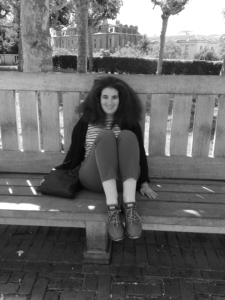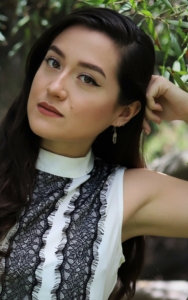Litdish: Emily Faith Grodin, Writer
 Emily Faith Grodin is an intelligent, passionate twenty-seven-year-old with autism, which impedes her ability to communicate verbally. Instead, she communicates through writing, creating powerful, moving poems and stories that welcome readers into her world.
Emily Faith Grodin is an intelligent, passionate twenty-seven-year-old with autism, which impedes her ability to communicate verbally. Instead, she communicates through writing, creating powerful, moving poems and stories that welcome readers into her world.
Until about two years prior to this interview, Emily was without language. With the help of her family, communication classes, a facilitating communicator, and an iPad, she identifies as a typer and communicates her words through the keyboard. After a visit to the Antioch University Los Angeles campus for a poetry seminar, we made contact with Emily to hear her story.
Emily is a contributer to Leaders Around Me: Autobiographies of Autistics who Type, Point & Spell to Communicate. She and her mother are also writing a memoir together, anticipated to be published in 2021. For more information on Emily and her upcoming work, visit her Facebook and Instagram @emilyfaithgrodin.
The following interview transpired via email in September 2019.
1. How long have you been reading poetry?
I have been listening to poetry from a young age. We may not realize it, but many children’s books are poetry from front to back. Stories and tales hidden within clever writing schemes. Aside from that, my parents are fond of poetry and have always read much to me. So it seems I have received poetry in some form or another for most of my life.
2. Do you have any favorite poets?
I think that Frost is a compelling poet to learn from. Robert Frost. His work is tough to analyze at times and often revolves around one person or event so specific to him that it can be a rewarding challenge to uncover.
3. What other activities do you enjoy besides writing?
I am a very motivated student and working towards my higher education is something that brings me great satisfaction. I love to dance and stay active. I especially love to travel. I enjoy eating delicious cuisines and occasionally cooking. I love to be in the company of interesting people. I will leave it at that.
4. When did you become aware of your communication needs?
Well, it becomes most easily apparent when you are in an environment with others your age who are communicating in ways that you cannot. I would say that was preschool for me. But there were moments before that when I was not able to express wants or needs and that led to frustration. Those moments, though, I did not have anything else to compare my own communication to.
5. What inspired you to begin writing poems?
Poetry was a really big part of the typing process for me. Many times, as an activity to initiate conversation, my communication partner and I would read poems and discuss them. Eventually, that led to writing my own as the activity. I have always been able to think of an event or see a picture and write about it. The confidence I have always felt in my ability to express through poetry has always been strong and so I am constantly inspired to continue writing.
6. Is poetry your best way of expressing yourself?
Poetry is one of my best tools for expressing. I think that everything I write has a poetic nature to it, but poetry is my favorite form of expression.
7. How has your writing benefited from your being nonverbal?
What I will say is that being nonverbal means a lot of listening. Listening to people speaking and writing that sounds wonderful and listening to words that have no life behind them. It has given me a deep understanding of language.
8. Is there a community of writers like you that you collaborate with? How did you find them?
If it means other typers, there are many of us. Thank you, actually, the next point I was going to make is that I think of myself as a writer first and typing is my method. I have felt most inspired by writers I have met in my classes and workshops. When I think of collaboration, I think of seeking and sharing inspiration. These people would be those who I have met at school and through personal writing projects.
9. Have you experienced discrimination as someone who is nonverbal?
The first thing that comes to mind is something that happens when someone is asking me something or someone might not speak directly to me because they think I don’t understand. But as for a single event that I will think about, I have always been very fortunate in this case.
10. How long after you learned to type did you begin writing?
It was a while before I began composing pieces that were true expression. Several months, I would say.
11. What advice would you give to other writers who are autistic?
To any writer, autistic or not, I would say to speak your truth. Find your voice. Let your words be of the honest joys and angers and expectations and failures that take place. Write just for yourself or to share with the world or do both.
12. There have been studies that say facilitated communication is not an accurate or meaningful mode of communication. Do you agree?
I think that many of the people who speak badly about FC have no idea what they are talking about. I believe that much of the controversy comes from the assumption that nonspeakers don’t think or understand. I have learned mostly of the controversy from overheard conversations on the topic. There has never been a person who has met me and seen how I communicate who has not understood that this is how I express myself. I obviously am biased, but it is simple enough to understand when someone sees how I type.
14. What are other misconceptions you’ve heard about being on the spectrum?
Well, I guess I speak mostly for the nonverbal side of not understanding language and the world. Not having thoughts and ideas and opinions. Not having empathy.
15. How would you like to be approached by somebody you don’t know?
I would say just a casual hello and a handshake when appropriate. No different than most.
* * *
Poems by Emily Faith Grodin
Speed Rally
Does the car make the man?
I asked Woody that. Not that he could hear me in his ’73 station wagon.
Not over the screeching of those mismatched white wall tires.
Kicking up mud all over his rusty panels.
You know, nowadays people think only smart cars drive fast.
But we say, so do old stick shift Volkswagens, if you know what you’re doing.
We know that engines aren’t what matter.
Neither do convertible racecars or Daddy’s money.
And don’t get us started on Ivy League degrees or $300 haircuts.
Some folks are born in the fast lane, and they expect everyone else to sit in traffic.
But the new car scent of their fancy rides fades fast.
Men who make their own roads? You can smell that authenticity a mile away.
Because what’s real lasts.
So, does the car make the man?
I’d put it in reverse.
The man makes the car. And the real speed rally is found in the driver.
Lady at the Kitchen Table
Late in the afternoon
When the sun peaks through and almost splits the room in half.
She emerges.
Floats through the room like a weightless balloon
caught on a soft current of air from an open window.
Some may call her frail,
Wrinkled lines and thinning skin,
But in her bright eyes there is a strength.
Hope and confidence still upright in a sea of blue
Waves eager to turn this vessel over,
She will not be moved.
The room fills with sweetness,
Roses freshly trimmed.
Warm cookies dipped in milk.
Her soft hands embrace a cup of tea,
Warmth engulfs her face as she lowers to sip.
All of long memories will fade with the steam,
A puzzled look settles in.
What’s been home for forty years now unfamiliar,
Glances around the room become as rapid as her beating heart.
She moans a desperate sigh,
Sadness pouring like the pitcher overturned splashes milk onto the floor.
Her brightness has faded just enough,
Each time a little more.
She awakens but was never asleep.
Lifts from her wooden chair her thin frame and stands tall.
Perhaps another cup of tea.
Amanda Lopez is a poet studying for her MFA at Antioch University Los Angeles (AULA), where she serves as Editor-in-Chief for the student-run literary magazine Lunch Ticket. She has served as a management assistant for Write Bloody Publishing and read on the literary journal The Redlands Review as Poetry Editor during her undergraduate years at the University of Redlands. Amanda is a Los Angeles native working on a collection of poetry about navigating relationships through mental illness. When Amanda is not writing, she finds passion in alternative and rock music, and in being a makeup and special effects artist.





